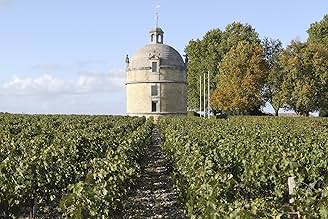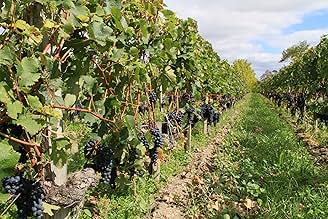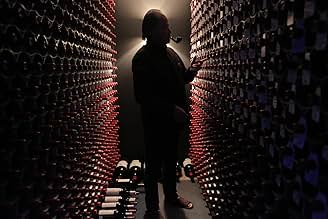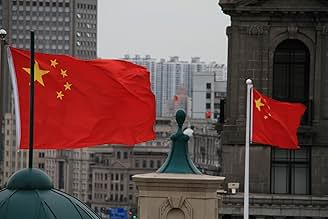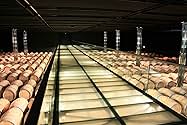AVALIAÇÃO DA IMDb
6,6/10
1,4 mil
SUA AVALIAÇÃO
Adicionar um enredo no seu idiomaThe great chateaux of Bordeaux struggle to accommodate the voracious appetite for their rare, expensive wines, which have become a powerful status symbol in booming China.The great chateaux of Bordeaux struggle to accommodate the voracious appetite for their rare, expensive wines, which have become a powerful status symbol in booming China.The great chateaux of Bordeaux struggle to accommodate the voracious appetite for their rare, expensive wines, which have become a powerful status symbol in booming China.
- Direção
- Roteiristas
- Artistas
- Prêmios
- 2 vitórias e 4 indicações no total
- Direção
- Roteiristas
- Elenco e equipe completos
- Produção, bilheteria e muito mais no IMDbPro
Avaliações em destaque
"Red Obsession" makes the viewer appreciate the true artistry involved in wine making, and the asomatous beauty involved in wine tasting (ordering wine at the Olive Garden is not wine tasting.) Drinking a good wine can be an orgasmic physical experience, as well as a genuinely spiritual one. Some of the interviewed eloquently describe an exquisite wine as an enduring experience.
The scenic views of French countryside and century-old vineyards are astounding. "Red Obsession" has some of the most spectacular cinematography this reviewer has ever seen. This alone is a very good reason to watch.
The film eventually moves into the current politics of the luxury wine industry. The epicentre of this business is currently China, which is now the largest importer of Bordeaux wines in the world. The rest of the film can be summarized in a sentence spoken by one of the commentators: "When the Chinese buy the wine, they buy the wine as a symbol of their status." The film's content, which includes exploration of the shifting market, and the changing production and consumption of premier château wines, was very informative and interesting to this uncultivated viewer. But the film is as untroubled as the well-off Chinese in it, who think nothing of dropping tens of millions of dollars buying wines, creating connoisseur clubs, or purchasing antiquated French chateaus.
Overflowing with conceit and extravagance, "Red Obsession" turns out mostly shallow and pretentious. The film doesn't ask any questions, or challenge conventional thinking, or break any new ground. Yes it is a documentary, but it is not constructive filmmaking.
screenplayisles.blogspot
The scenic views of French countryside and century-old vineyards are astounding. "Red Obsession" has some of the most spectacular cinematography this reviewer has ever seen. This alone is a very good reason to watch.
The film eventually moves into the current politics of the luxury wine industry. The epicentre of this business is currently China, which is now the largest importer of Bordeaux wines in the world. The rest of the film can be summarized in a sentence spoken by one of the commentators: "When the Chinese buy the wine, they buy the wine as a symbol of their status." The film's content, which includes exploration of the shifting market, and the changing production and consumption of premier château wines, was very informative and interesting to this uncultivated viewer. But the film is as untroubled as the well-off Chinese in it, who think nothing of dropping tens of millions of dollars buying wines, creating connoisseur clubs, or purchasing antiquated French chateaus.
Overflowing with conceit and extravagance, "Red Obsession" turns out mostly shallow and pretentious. The film doesn't ask any questions, or challenge conventional thinking, or break any new ground. Yes it is a documentary, but it is not constructive filmmaking.
screenplayisles.blogspot
This is an Australian-produced doco, looking at the history of wines from Bordeaux.
It is 75 minutes long.
After 75 minutes, I was aware that they have been making wines in Bordeaux since the Romans brought the vines; that Napoleon III had the wines graded in 1855 and the grades given remain to this day; that conditions come together for a great vintage about every 20 years; that wine is bought as an investment; that Americans have stopped buying it but the Chinese now do; that some French are sniffily xenophobic about dealing with the Chinese and that if the Chinese ever stop buying, the market may collapse.
Those facts took 75 minutes to explain. 75 very long minutes.
Some nice aerial photography. And looking at beautifully designed and constructed French chateaux is always easy on the eye.
The film had a nice, laconic commentary from Russell Crowe whose smoky, tobacco-enhanced voice fitted the subject well.
But it was all just too superficial, too under-researched with not enough of interest to fill the film's time span. Some more history would have been welcome; the Great French Wine Blight of the late 1850s post-dated Napoleon III's gradings – didn't the blight make them obsolete? This question wasn't addressed but would seem fundamental to an evaluation of Bordeaux. Still, I'm sure had I gone to France's bucolic beauty spots to research such a film, I too would have been so distracted drinking the stuff I'd have forgotten the reason for the visit.
It is 75 minutes long.
After 75 minutes, I was aware that they have been making wines in Bordeaux since the Romans brought the vines; that Napoleon III had the wines graded in 1855 and the grades given remain to this day; that conditions come together for a great vintage about every 20 years; that wine is bought as an investment; that Americans have stopped buying it but the Chinese now do; that some French are sniffily xenophobic about dealing with the Chinese and that if the Chinese ever stop buying, the market may collapse.
Those facts took 75 minutes to explain. 75 very long minutes.
Some nice aerial photography. And looking at beautifully designed and constructed French chateaux is always easy on the eye.
The film had a nice, laconic commentary from Russell Crowe whose smoky, tobacco-enhanced voice fitted the subject well.
But it was all just too superficial, too under-researched with not enough of interest to fill the film's time span. Some more history would have been welcome; the Great French Wine Blight of the late 1850s post-dated Napoleon III's gradings – didn't the blight make them obsolete? This question wasn't addressed but would seem fundamental to an evaluation of Bordeaux. Still, I'm sure had I gone to France's bucolic beauty spots to research such a film, I too would have been so distracted drinking the stuff I'd have forgotten the reason for the visit.
This is a documentary for wine lovers. Beer drinkers need not apply.
The film is tastefully done, great photography, beautiful soundtrack. Needs to be watched with a glass of red wine in hand, as it really whets your appetite.
Should it go deeper into the subject? Should it explain that the great French Wine Blight did NOT make the 1855 classification obsolete, because the vines were grafted to Chilean roots (resistant to the phylloxera) imported hastily in thousands, to save them (not only in France, but in other parts of Europe too)?
Maybe. That would have made for a slightly longer film, perhaps more thrilling (Will the vines be completely lost? Who could save them? Wait! Up in the sky: it's a bird... it's a plane... No, it's super-vine! Actually, it was "la super viña", from Chile).
But it would have been a different film, missing the elegant balance of this one.
Perhaps this film's success will spur a sequel: "Red Obsession 2 - Attack of the insects from Hell". It will need a different soundtrack (by Hans Zimmer?) and a different narrator; Russell Crowe is too mellow for that!
The film is tastefully done, great photography, beautiful soundtrack. Needs to be watched with a glass of red wine in hand, as it really whets your appetite.
Should it go deeper into the subject? Should it explain that the great French Wine Blight did NOT make the 1855 classification obsolete, because the vines were grafted to Chilean roots (resistant to the phylloxera) imported hastily in thousands, to save them (not only in France, but in other parts of Europe too)?
Maybe. That would have made for a slightly longer film, perhaps more thrilling (Will the vines be completely lost? Who could save them? Wait! Up in the sky: it's a bird... it's a plane... No, it's super-vine! Actually, it was "la super viña", from Chile).
But it would have been a different film, missing the elegant balance of this one.
Perhaps this film's success will spur a sequel: "Red Obsession 2 - Attack of the insects from Hell". It will need a different soundtrack (by Hans Zimmer?) and a different narrator; Russell Crowe is too mellow for that!
I'm a wine person.
I have consumed, studied, taught and debated the topic for almost 30 years now. I love the stuff. But... watching this film reminded me how wound up we wine-people are in our own world.
Although I found the documentary interesting and important to know, I also recognise that this film grossed less than US$10,000- at the box office. Now, I don't know what the budget was to make this film, but who in their right mind thought that this would be a good idea for a theatrical release? I'm guessing that enough people got together and convinced themselves that this would work. And secured enough funding from (almost surely) a wealthy wine-lover.
No rational film producer would ever have looked at the script and gone 'Yeah, images of French châteaux, and celebrities in the wine field will be a huge hit! Let's get Rusty to narrate and we've got it made!!!'
If you're just starting to develop an interest in wine, this should be mandatory watching. Enthusiasts already know most of the content, and will probably bemoan the lack of further detail. But if wine isn't your thing, you'll really wish you'd spent the 75 minutes on another film.
I have consumed, studied, taught and debated the topic for almost 30 years now. I love the stuff. But... watching this film reminded me how wound up we wine-people are in our own world.
Although I found the documentary interesting and important to know, I also recognise that this film grossed less than US$10,000- at the box office. Now, I don't know what the budget was to make this film, but who in their right mind thought that this would be a good idea for a theatrical release? I'm guessing that enough people got together and convinced themselves that this would work. And secured enough funding from (almost surely) a wealthy wine-lover.
No rational film producer would ever have looked at the script and gone 'Yeah, images of French châteaux, and celebrities in the wine field will be a huge hit! Let's get Rusty to narrate and we've got it made!!!'
If you're just starting to develop an interest in wine, this should be mandatory watching. Enthusiasts already know most of the content, and will probably bemoan the lack of further detail. But if wine isn't your thing, you'll really wish you'd spent the 75 minutes on another film.
I like to enjoy a decent wine. I don't drink a Château Latour or a Château Lafite Rothschield simply because I can't afford them, but If I could, I believe I would once in a while delight myself with such an exquisite occupation. It is strange however, after watching this movie, that my sympathy and respect for red wine didn't increase. In fact, it decreased for a moment.
This documentary is totally hollow. You squeeze it and nothing comes out. You learn virtually nothing about nothing and you are fed with the usual clichés and prejudices about the new economic giant known as China, its people and the globalized world.
The cinematography is also one of the most boring I remember to have witnessed in years. This incipient self-centered director, insists in punching you over and over, again and again, with bird views of French chateaus and never ending vineyards, intercalated with interviews so empty, so senseless, so snobbish, that you start to feel a certain discomfort, even disgust.
Everything tastes very thin, very superficial, very made out of plastic, unlike the Bordeaux wines that deserved a much serious and better documented approach.
The only positive note about this waste of time was the narrator's voice, lent by Russel Crowe.
This documentary is totally hollow. You squeeze it and nothing comes out. You learn virtually nothing about nothing and you are fed with the usual clichés and prejudices about the new economic giant known as China, its people and the globalized world.
The cinematography is also one of the most boring I remember to have witnessed in years. This incipient self-centered director, insists in punching you over and over, again and again, with bird views of French chateaus and never ending vineyards, intercalated with interviews so empty, so senseless, so snobbish, that you start to feel a certain discomfort, even disgust.
Everything tastes very thin, very superficial, very made out of plastic, unlike the Bordeaux wines that deserved a much serious and better documented approach.
The only positive note about this waste of time was the narrator's voice, lent by Russel Crowe.
Você sabia?
- ConexõesFeatured in At the Movies: Episode #10.26 (2013)
Principais escolhas
Faça login para avaliar e ver a lista de recomendações personalizadas
Detalhes
- Data de lançamento
- Países de origem
- Centrais de atendimento oficiais
- Idioma
- Também conhecido como
- Red Obsession
- Empresa de produção
- Consulte mais créditos da empresa na IMDbPro
Bilheteria
- Faturamento bruto nos EUA e Canadá
- US$ 13.199
- Fim de semana de estreia nos EUA e Canadá
- US$ 5.060
- 8 de set. de 2013
- Faturamento bruto mundial
- US$ 238.223
- Tempo de duração1 hora 15 minutos
- Cor
- Mixagem de som
- Proporção
- 1.85 : 1
Contribua para esta página
Sugerir uma alteração ou adicionar conteúdo ausente




